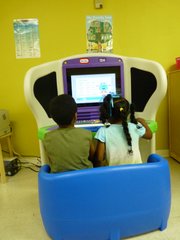Wednesday, August 22, 2012
In a fascinating article: "We, The Web Kids," Pietr Czerski, makes a statement that is as startling as it is startlingly true: "We do not use the Internet, we live on the Internet."
"The Internet to us is not something external to reality but a part of it: an invisible yet constantly present layer intertwined with the physical environment," he writes. "We made friends and enemies online, we prepared cribs for tests online, we planned parties and studying sessions online, we fell in love and broke up online. The Web to us is not a technology which we had to learn and which we managed to get a grip of. The Web is a process, happening continuously and continuously transforming before our eyes; with us and through us."
Written to be a "manifesto" against the Anti-Counterfeiting Trade Agreement (ACTA) for TechDirt.com, March 1, it was translated from Polish and has since gone viral. It does clearly draw a line between today's youth and their parents.
A critical point: "We did not experience an impulse from reality, but rather a metamorphosis of the reality itself," he writes.
In effect, the Internet and this generation is a symbiosis of electronic and physical sensation, each feeding upon the other, enunciating a new relationship between human and technology to become a human technology. (If you want to see the future, imagine iPhone's Siri with a higher IQ.)
Some will see the manifesto as a new challenge to existing ways of viewing the world, but the late postmodern theorist Jean Baudrillard predicted it. When things are reduced to their image or sign value, he posited, societies become enmeshed in "hyperreality," and reality, as it is known, "dies out."
Reality hasn't disappeared (frogs still see as frogs see; birds as birds, etc.), but human consciousness has adopted a "simulated version" of a more coherent vision or concept that shapes ideas about reality.
Hence, an object loses the primacy of its functional or exchange values and gains in its symbolic or "sign" value. (See Baudrillard's book "Simulacra and Simulation," University of Michigan Press, 1995.) For example, a smartphone may have added value as a sign when it's a Blackberry, Droid or iPhone—it says more about the user than its maker.
But of greater significance, perhaps, the manifesto adds further credence to "The End of History" ideas Baudrillard and others espoused that, with the end of the Cold War and of the rise of a global worldview, history defined as a progression of events is no longer a valid way of viewing the world. Rather, as the manifesto notes: "Global culture is the fundamental building block of our identity, more important for defining ourselves than traditions, historical narratives, social status, ancestry or even the language that we use."
The "Web Kids" are not in awe of The End of History as his parents were, but have lived through it and have gone on. The Arab Spring, for example, didn't happen in a far-off land; it was here and now, instantaneous with Twitter, shared visually with YouTube and chronicled on Facebook within friendship and familial circles. It's not the narrative sense of history as previously defined, but an organic, nonlinear presence that is "happening" in multiple places simultaneously—an ongoing dialogue of signs.
As Baudrillard says: "The simulacrum is never what hides the truth—it is truth that hides the fact that there is none. The simulacrum is true."
Driving history now is the sign of freedom, youth and a new global reality that is, essentially, itself unfolding. That is an exciting development, watching not "history" but a new "his/her story."
Are we to despair that reality shall progress along ever more shallow lines and superficial values? To the contrary: In fact, it may drive the search for meaning ever more vigorously.
One example is the rise of "slow food," and toward more pesticide-free food, grown locally and organically, though not necessarily having the government-sanctioned USDA certified organic stamp.
Web Kids not only grew up with the Internet, but fast food. They witnessed firsthand the commodification of food, yet they seem to be the ones leading a movement against fast food, using the tools that are uniquely theirs.
The Web Kids embracing slow food is evidenced on Twitter with popular hashtags: #realfood, #slowfood, #ecofarming and #organic are its positive signifiers. The rise of #foodies and appreciation of chefs as superstars is another hopeful sign for a return to an appreciation for healthful, nutritious food and a caring attitude toward the Earth.
This philosophy of good, clean and fair is almost a mantra of Web Kids, and a is welcome addition to ways of looking at the world. It is the underlying theme of such outward protests as Occupy Wall Street, and it is breaking out all over the globe, with the Arab Spring, perhaps, being its most virulent expression.
Despair? No! The rise of the Web Kids is cause for celebration! Preferably with good food and friends.
Read the translated article "We The Web Kids" at jfp.ms/webkids.
